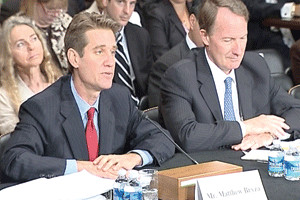U.S. Senate Committee on Foreign Relations has held hearings on nominations of ambassadors-designates to Azerbaijan, Greece, Island and Bosnia and Herzegovina.
Presiding the hearings, democrat Senator Jeanne Shaheen from New Hampshire highlighted the importance of the countries for the United States` interests in Europe and the Caucasus. She said each of those countries play a role of "important partner" for the United States.
As to Azerbaijan, Shaheen said the country connects the Western world with the Muslim one and is located in the geostrategic region.
The Senator said relations with Azerbaijan must be developed by using the recent visits of Secretary of Defense Robert Gates and Secretary of State Hillary Clinton to Baku. She stressed that a role of the United States in the OSCE Minsk Group would be "significant" to put an end to the violation in the Nagorno-Karabakh and to open a new page in this regard.
The Committee's Ranking Member, Senator Dick Lugar for Indiana, said he has reviewed each nominee's credentials and believes "that this panel is superbly qualified to represent the United States at our various embassies in Europe and Eurasia".
Concerning Matthew Bryza, US President's nominee to be Ambassador to Azerbaijan, Lugar said this nomination comes after a lapse in ambassadorial representation in Baku.
"I am concerned that the continuing absence of a Senate-confirmed U.S. representative there could impede progress toward several U.S. national security goals," the Senator said.
"Our Committee has worked closely with our Envoy for Eurasian Energy, Ambassador Richard Morningstar, to promote the expansion of the Nabucco pipeline, the key element of a southern energy corridor that would stretch from the Caspian region to Europe. Progress on this measure will allow our allies to diversify energy supplies, while providing nations in the region with a focus for closer cooperation. The Nabucco pipeline's commercial and political viability will depend on both Azerbaijan's commitment of its indigenous resources and its willingness to serve as a transport hub for Central Asian energy across the Caspian from Kazakhstan, Turkmenistan, and possibly other countries."
"A close partnership with Azerbaijan and other nations in the South Caucasus will also be essential to ensure the transit of supplies to our troops in the Middle East and to resolve complex disputes concerning the Nagorno-Karabakh enclave. The ongoing success of Nunn-Lugar efforts to renovate biological reference facilities and modernize the Azerbaijani coast guard also will require the close attention of our next Ambassador in Baku," the Senator pointed out.
"Matthew Bryza is uniquely qualified to advance these U.S. priorities. "He possesses exceptional knowledge of the region, having spent the last thirteen years working on U.S. foreign policy in Europe and the Caucasus from both the White House and State Department," stated Lugar.
After Lugar`s introduction, ambassador-designate to Azerbaijan Matthew J. Bryza made a speech before the Committee members.
Bryza described Azerbaijan as "an important partner of the United States".
"Located at the crossroads of Europe, the Middle East, and Central Asia, Azerbaijan is a secular state with a Muslim-majority population, rich history, and religious and ethnic diversity. Azerbaijan's major hydrocarbon resources have driven its economic growth at one of the fastest rates in the world in recent years."
"But, Azerbaijan has a long way to go to translate this growth into deeper reforms that unlock the full potential of its dynamic citizens and advance peace and prosperity throughout its region. The United States is committed to helping Azerbaijan overcome these challenges and to achieving our shared interests as partners. Secretary Gates delivered this message during his visit to Baku in June, and Secretary Clinton's recent visit to Azerbaijan is further evidence of this commitment. If confirmed, I will work to invigorate the U.S.-Azerbaijan partnership in pursuit of the U.S.`s three sets of strategic interests in Azerbaijan, notably security, energy, and democratic reform," he underscored.
On security, Bryza said Azerbaijan established itself as a "key partner" of the United States the day after the terror attacks of September 11, 2001.
As to Nagorno-Karabakh conflict, the ambassador-designate said together with Russian and French counterparts d he developed as Co-Chairs of the OSCE`s Minsk Group and the work they did together to try and bring Azerbaijan and Armenia closer to a negotiated solution based on the principles contained in the Helsinki Final Act, specifically those related to refraining from the threat or use of force, the territorial integrity of States, and the equal rights and self-determination of peoples.
"If confirmed, I will support my successor as U.S. Co-Chair, Ambassador Robert Bradtke, and his two Minsk Group colleagues in their efforts to pursue an agreed resolution between the two countries," Bryza said.
"Azerbaijan's energy resources can help diversify global supplies of oil and gas and catalyze the economic growth and integration of the entire South Caucasus with global markets. Thanks to projects such as the Baku-Tbilisi-Ceyhan oil pipeline, Caspian oil now reaches global markets in a commercially and environmentally sound way, free from potential cutoffs by monopolists or geographic choke points. In addition to oil, Azerbaijan is now becoming a crucial actor in our European allies` efforts to diversify their supplies of natural gas. If confirmed, I will continue to support development of a Southern Corridor of natural gas infrastructure to link gas reserves in Azerbaijan - and perhaps Central Asia - with markets in Europe."
{nl}
AzerTAc
© İstifadə edilərkən "Xalq qəzeti"nə istinad olunmalıdır.




















